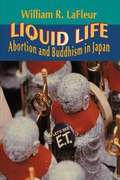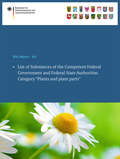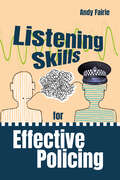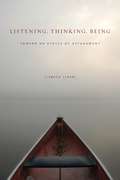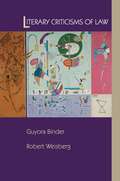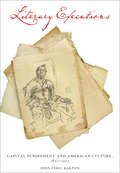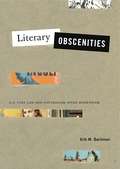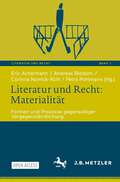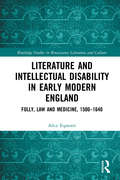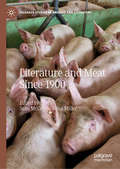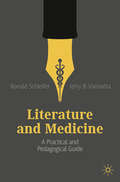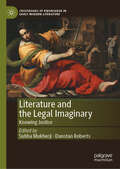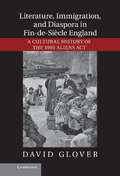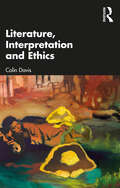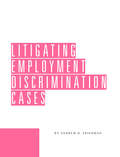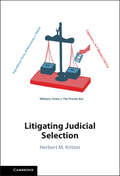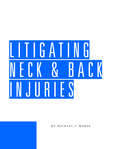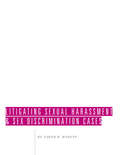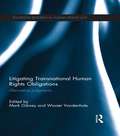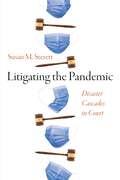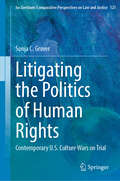- Table View
- List View
Liquid Life: Abortion And Buddhism In Japan
by William R. LafleurWhy would a country strongly influenced by Buddhism's reverence for life allow legalized, widely used abortion? Equally puzzling to many Westerners is the Japanese practice of mizuko rites, in which the parents of aborted fetuses pray for the well-being of these rejected "lives. " In this provocative investigation, William LaFleur examines abortion as a window on the culture and ethics of Japan. At the same time he contributes to the Western debate on abortion, exploring how the Japanese resolve their conflicting emotions privately and avoid the pro-life/pro-choice politics that sharply divide Americans on the issue.
List of Substances of the Competent Federal Government and Federal State Authorities
by Bundesamt Für Verbraucherschutz Und Lebe StaffList of Substances of the Competent Federal Government and Federal State Authorities Plants and plant preparations are an important part of a balanced diet. Apart from using them as fruit, vegetables or cereals we can also enjoy them as ingredients in the form of herbs or spices or enjoy them in teas. More and more exotic plants are also available whose use as food in Germany was not known up to now. Supermarkets and drugstores also sell an increasing number of products which supposedly benefit health and contain preparations which were previously used in Germany above all in pharmaceutical products. The present category "Plants and plant parts" of the List of Substances of the Competent Federal Government and Federal State Authorities was provided to facilitate the classification and evaluation of plants and plant parts regarding their use as food or food ingredients. In addition to classification under formal legal aspects the list also provides information on the possible risks involved with certain uses. The list of substances is intended as a guideline for authorities and those placing products on the market.
Listening Skills for Effective Policing
by Andy FairieDeveloping and honing effective listening skills for trainee, new and existing police officers at all levels.Learning how to be an effective listener is one of the most vital communication skills for successful policing. Drawing on the author’s vast experience as a specialist frontline police officer, this book is informal and easy-to-understand, with a sprinkle of humour, making it highly readable and accessible. It introduces an effective, tried and tested model to guide difficult conversations and covers a range of key topics of relevance to operational policing, including issues connected with diversity and with suicide. Supported by academic research, including counselling theory, it provides real-life examples to demonstrate how the tools work in practice, and questions and exercises to encourage personal reflection.
Listening, Thinking, Being: Toward an Ethics of Attunement
by Lisbeth LipariAlthough listening is central to human interaction, its importance is often ignored. In the rush to speak and be heard, it is easy to neglect listening and disregard its significance as a way of being with others and the world. Drawing upon insights from phenomenology, linguistics, philosophy of communication, and ethics, Listening, Thinking, Being is both an invitation and an intervention meant to turn much of what readers know, or think they know, about language, communication, and listening inside out. It is not about how to be a good listener or the numerous pitfalls that stem from the failure to listen. Rather, the purpose of the book is, first, to make readers aware of the value and importance of listening as a fundamental human ability inextricably connected with language and thought; second, to alert readers to the complexity of listening from personal, cultural, and philosophical perspectives; and third, to offer readers a way to think of listening as a mode of communicative action by which humans create and abide in the world. Lisbeth Lipari brings together historical, literary, intercultural, scientific, musical, and philosophical perspectives, as well as a range of her own personal experiences, to produce this highly readable analysis of how “the human experience of being as an ethical relation with others . . . is enacted by means of listening.”
Listening, Thinking, Being: Toward an Ethics of Attunement
by Lisbeth LipariAlthough listening is central to human interaction, its importance is often ignored. In the rush to speak and be heard, it is easy to neglect listening and disregard its significance as a way of being with others and the world. Drawing upon insights from phenomenology, linguistics, philosophy of communication, and ethics, Listening, Thinking, Being is both an invitation and an intervention meant to turn much of what readers know, or think they know, about language, communication, and listening inside out. It is not about how to be a good listener or the numerous pitfalls that stem from the failure to listen. Rather, the purpose of the book is, first, to make readers aware of the value and importance of listening as a fundamental human ability inextricably connected with language and thought; second, to alert readers to the complexity of listening from personal, cultural, and philosophical perspectives; and third, to offer readers a way to think of listening as a mode of communicative action by which humans create and abide in the world. Lisbeth Lipari brings together historical, literary, intercultural, scientific, musical, and philosophical perspectives, as well as a range of her own personal experiences, to produce this highly readable analysis of how “the human experience of being as an ethical relation with others . . . is enacted by means of listening.”
Literary Criticisms of Law
by Guyora Binder Robert WeisbergIn this book, the first to offer a comprehensive examination of the emerging study of law as literature, Guyora Binder and Robert Weisberg show that law is not only a scheme of social order, but also a process of creating meaning, and a crucial dimension of modern culture. They present lawyers as literary innovators, who creatively interpret legal authority, narrate disputed facts and hypothetical fictions, represent persons before the law, move audiences with artful rhetoric, and invent new legal forms and concepts. Binder and Weisberg explain the literary theories and methods increasingly applied to law, and they introduce and synthesize the work of over a hundred authors in the fields of law, literature, philosophy, and cultural studies. Drawing on these disparate bodies of scholarship, Binder and Weisberg analyze law as interpretation, narration, rhetoric, language, and culture, placing each of these approaches within the history of literary and legal thought. They sort the styles of analysis most likely to sharpen critical understanding from those that risk self-indulgent sentimentalism or sterile skepticism, and they endorse a broadly synthetic cultural criticism that views law as an arena for composing and contesting identity, status, and character. Such a cultural criticism would evaluate law not simply as a device for realizing rights and interests but also as the framework for a vibrant cultural life.
Literary Executions: Capital Punishment and American Culture, 1820–1925
by John Cyril BartonExamines literary and legal sources to document thoughts and feelings about capital punishment in the United States over the long nineteenth century.Drawing from legal and extralegal discourse but focusing on imaginative literature, Literary Executions examines representations of, responses to, and arguments for and against the death penalty in the United States over the long nineteenth century. John Cyril Barton creates a generative dialogue between artistic relics and legal history. He looks to novels, short stories, poems, and creative nonfiction as well as legislative reports, trial transcripts, legal documents, newspaper and journal articles, treatises, and popular books (like The Record of Crimes, A Defence of Capital Punishment, and The Gallows, the Prison, and the Poor House), all of which were part of the debate over the death penalty.Barton focuses on several canonical figures—James Fenimore Cooper, Nathaniel Hawthorne, Lydia Maria Child, Walt Whitman, Herman Melville, and Theodore Dreiser—and offers new readings of their work in light of the death penalty controversy. Barton also gives close attention to a host of then-popular-but-now-forgotten writers—particularly John Neal, Slidell MacKenzie, William Gilmore Simms, Sylvester Judd, and George Lippard—whose work helped shape or was shaped by the influential anti-gallows movement. Analyzing the tension between sovereignty and social responsibility in a democratic republic, Barton argues that the high stakes of capital punishment dramatize the confrontation between the citizen-subject and sovereign authority in its starkest terms. In bringing together the social and the aesthetic, Barton shows how legal forms informed literary forms and traces the emergence of the modern State in terms of the administration of lawful death.By engaging the politics and poetics of capital punishment, Literary Executions contends that the movement to abolish the death penalty in the United States should be seen as an important part of the context that brought about the flowering of the American Renaissance during the antebellum period and that influenced literature later in the nineteenth and early twentieth centuries.
Literary Executions: Capital Punishment and American Culture, 1820–1925
by John Cyril Barton“Rich with historical detail . . . examines the figure and theme of the death penalty in imaginative literature from Cooper to Dreiser.” —Gregg Crane, Professor of English Language and Literature, University of MichiganDrawing from legal and extralegal discourse but focusing on imaginative literature, Literary Executions examines representations of, responses to, and arguments for and against the death penalty in the United States over the long nineteenth century. John Cyril Barton creates a generative dialogue between artistic relics and legal history. He looks to novels, short stories, poems, and creative nonfiction as well as legislative reports, trial transcripts, legal documents, newspaper and journal articles, treatises, and popular books (like The Record of Crimes, A Defence of Capital Punishment, and The Gallows, the Prison, and the Poor House), all of which were part of the debate over the death penalty.Barton focuses on several canonical figures—James Fenimore Cooper, Nathaniel Hawthorne, Lydia Maria Child, Walt Whitman, Herman Melville, and Theodore Dreiser—and offers new readings of their work in light of the death penalty controversy. Barton also gives close attention to a host of then-popular-but-now-forgotten writers—particularly John Neal, Slidell MacKenzie, William Gilmore Simms, Sylvester Judd, and George Lippard—whose work helped shape or was shaped by the influential anti-gallows movement.By engaging the politics and poetics of capital punishment, Literary Executions contends that the movement to abolish the death penalty in the United States should be seen as an important part of the context that brought about the flowering of the American Renaissance during the antebellum period and that influenced literature later in the nineteenth and early twentieth centuries
Literary Obscenities: U.S. Case Law and Naturalism after Modernism (Refiguring Modernism #25)
by Erik M. BachmanThis comparative historical study explores the broad sociocultural factors at play in the relationships among U.S. obscenity laws and literary modernism and naturalism in the early twentieth century. Putting obscenity case law’s crisis of legitimation and modernism’s crisis of representation into dialogue, Erik Bachman shows how obscenity trials and other attempts to suppress allegedly vulgar writing in the United States affected a wide-ranging debate about the power of the printed word to incite emotion and shape behavior.Far from seeking simply to transgress cultural norms or sexual boundaries, Bachman argues, proscribed authors such as Wyndham Lewis, Erskine Caldwell, Lillian Smith, and James T. Farrell refigured the capacity of writing to evoke the obscene so that readers might become aware of the social processes by which they were being turned into mass consumers, voyeurs, and racialized subjects. Through such efforts, these writers participated in debates about the libidinal efficacy of language with a range of contemporaries, from behavioral psychologists and advertising executives to book cover illustrators, magazine publishers, civil rights activists, and judges.Focusing on case law and the social circumstances informing it, Literary Obscenities provides an alternative conceptual framework for understanding obscenity’s subjugation of human bodies, desires, and identities to abstract social forces. It will appeal especially to scholars of American literature, American studies, and U.S. legal history.
Literatur und Recht: Formen und Prozesse gegenseitiger Vergegenständlichung (Literatur und Recht #1)
by Andreas Blödorn Corinna Norrick-Rühl Eric Achermann Petra PohlmannLiteratur hat nicht selten Recht als ihren Gegenstand, und Recht regelt Literatur auf vielfältige Weise. Diese gegenseitige Vergegenständlichung, zusammengefasst unter dem Begriff der „Materialität“, geschieht in verschiedenen Formen und erfüllt unterschiedliche Funktionen. Daraus ergibt sich eine Fülle von Fragen zur normativen Qualität des Rechts und zu den kulturellen Reflexionsleistungen der Literatur. Der Band fragt daneben auch konkreter nach der Rechtsförmigkeit des Fiktiven, der narrativen Ordnung von Rechtstexten, der historischen Wandelbarkeit des Verhältnisses von Recht und Literatur oder den rechtlichen Bedingungen des Buchmarktes.Dies ist ein Open-Access-Buch.
Literature and Intellectual Disability in Early Modern England: Folly, Law and Medicine, 1500-1640 (Routledge Studies in Renaissance Literature and Culture)
by Alice EquestriFools and clowns were widely popular characters employed in early modern drama, prose texts and poems mainly as laughter makers, or also as ludicrous metaphorical embodiments of human failures. Literature and Intellectual Disability in Early Modern England: Folly, Law and Medicine, 1500–1640 pays full attention to the intellectual difference of fools, rather than just their performativity: what does their total, partial, or even pretended ‘irrationality’ entail in terms of non-standard psychology or behaviour, and others’ perception of them? Is it possible to offer a close contextualised examination of the meaning of folly in literature as a disability? And how did real people having intellectual disabilities in the Renaissance period influence the representation and subjectivity of literary fools? Alice Equestri answers these and other questions by investigating the wide range of significant connections between the characters and Renaissance legal and medical knowledge as presented in legal records, dictionaries, handbooks, and texts of medicine, natural philosophy, and physiognomy. Furthermore, by bringing early modern folly in closer dialogue with the burgeoning fields of disability studies and disability theory, this study considers multiple sides of the argument in the historical disability experience: intellectual disability as a variation in the person and as a difference which both society and the individual construct or respond to. Early modern literary fools’ characterisation then emerges as stemming from either a realistic or also from a symbolical or rhetorical representation of intellectual disability.
Literature and Meat Since 1900 (Palgrave Studies in Animals and Literature)
by John Miller Seán McCorryThis collection of essays centers on literary representations of meat-eating, bringing aesthetic questions into dialogue with more established research on the ethics and politics of meat. From the decline of traditional animal husbandry to the emergence of intensive agriculture and the biotechnological innovation of in vitro meat, the last hundred years have seen dramatic changes in meat production. Meat consumption has risen substantially, inciting the emergence of new forms of political subjectivity, such as the radical rejection of meat production in veganism. Featuring essays on both canonical and lesser-known authors, Literature and Meat Since 1900 illustrates the ways in which our meat regime is shaped, reproduced and challenged as much by cultural and imaginative factors as by political contestation and moral reasoning.
Literature and Medicine: A Practical and Pedagogical Guide
by Ronald Schleifer Jerry B. VannattaLiterature and Medicine: A Practical and Pedagogical Guide is designed to introduce narrative medicine in medical humanities courses aimed at pre-medicine undergraduates and medical and healthcare students. With excerpts from short stories, novels, memoirs, and poems, the book guides students on the basic methods and concepts of the study of narrative. The book helps healthcare professionals to build a set of skills and knowledge central to the practice of medicine including an understanding of professionalism, building the patient-physician relationship, ethics of medical practice, the logic of diagnosis, recognizing mistakes in medical practice, and diversity of experience. In addition to analyzing and considering the literary texts, each chapter includes a vignette taken from clinical situations to help define and illustrate the chapter’s theme. Literature and Medicine illustrates the ways that engagement with the humanities in general, and literature in particular, can create better and more fulfilled physicians and caretakers.
Literature and the Legal Imaginary: Knowing Justice (Crossroads of Knowledge in Early Modern Literature #4)
by Subha Mukherji Dunstan RobertsTuning into the collective understanding of law as lived experience, Knowing Justice is a timely and distinctive intervention in the field of law and literature. It seeks to understand and inhabit the intersection between judicial procedure, legal thinking and imaginative practice, where epistemic processes that elude the formal discourses of law and legal history are generated and brought into view. But the law in early modern England – the focus of this book though not its horizon – was also an imaginative resource and a repository of structures of feeling. These are functions uniquely grasped through literary mediation because literature shares the representational modes and structures of law but not its methods or ends. Bringing together established and younger scholars from literary studies, legal history, theology and law, and employing a variety of approaches, this collection of essays eschews flat description in favour of layered analysis, cognisant of the plurality of concept, practice and representation. In using a literary lens, it treats apparent binaries or distinct registers as interlinked constituents of an ecology, and navigates the gap between abstract jurisprudence and the affective, composite, social event of justice or judgment. Its perception of ‘literature’, likewise, is capacious: including imaginative method, literary strategies used by law and its cognate disciplines, and hermeneutic and critical methods that are traditionally regarded as literary. Its notion of epistemology, meanwhile, encompasses not simply the condition of judicial knowledge but also its process, psychology and ethics: it attempts to know justice at the same time as it attends to what justice knows, fails to know, or resists knowing.
Literature, Immigration, and Diaspora in Fin-De-SièCle England
by David GloverThe 1905 Aliens Act was the first modern law to restrict immigration to British shores. In this book, David Glover asks how it was possible for Britain, a nation that had prided itself on offering asylum to refugees, to pass such legislation. Tracing the ways that the legal notion of the 'alien' became a national-racist epithet indistinguishable from the figure of 'the Jew', Glover argues that the literary and popular entertainments of fin de siècle Britain perpetuated a culture of xenophobia. Reconstructing the complex socio-political field known as 'the alien question', Glover examines the work of George Eliot, Israel Zangwill, Rudyard Kipling and Joseph Conrad, together with forgotten writers like Margaret Harkness, Edgar Wallace and James Blyth. By linking them to the beliefs and ideologies that circulated via newspapers, periodicals, political meetings, Royal Commissions, patriotic melodramas and social surveys, Glover sheds new light on dilemmas about nationality, borders and citizenship.
Literature, Interpretation and Ethics
by Colin DavisLiterature, Interpretation and Ethics argues for the centrality of hermeneutics in the context of ongoing debates about the value and values of literature, and about the role and ethics of literary study. Hermeneutics is the endeavor to understand the nature of interpretation, as it poses vital questions about how we make sense of works of art, our own lives, other people and the world around us.The book outlines the contribution of hermeneutics to literary study through detailed accounts of role of interpretation in the work of key thinkers such as Martin Heidegger, Hans-Georg Gadamer, Paul Ricoeur, Umberto Eco, Jacques Derrida and Emmanuel Levinas. It also illustrates problems of interpretation posed by specific literary texts and films, emphasising how our interpretive acts also entail ethical engagements. The book develops a ‘hermeneutics of (guarded) trust’, which calls for attention to the agency of art without surrendering critical vigilance.Through a series of forays into theoretical texts, literary works and films, the book contributes to contemporary debates about critical practice and the cultural value. Interpretation, it suggests, is always fallible but it is also essential to our place in the world, and to the importance of the humanities.
Litigating Employment Discrimination Cases
by Andrew FriedmanLitigating Employment Discrimination Cases Most employment discrimination books deliver black-letter law and omit strategies, pitfalls, and forms. Andrew H. Friedman's Litigating Employment Discrimination Cases takes a more practical approach. Focusing on evaluation, discovery, summary judgment, and mediation, this affordable strategic guide delivers proven tactics, pattern arguments, common mistakes, and model forms for experienced plaintiff and defense lawyers. The book's collection of over 180 forms includes: * Engagement letters * Complaints * Demand letters * Deposition outlines * Pattern interrogatories * Requests for production * Mediation briefs and letters * Settlement agreements * Juror questionnaires * Motions in limine Litigating Employment Discrimination Cases is packed with pattern arguments supported by thousands of recent cases with parentheticals and pinpoint citations, pleadings, motions, discovery documents, deposition outlines, pitfalls to avoid, and, most importantly, practice-proven tactics and techniques. Some of the areas covered include: Discovery * Defending employer's efforts to interview the plaintiff. * Controlling ancillary proceedings. Summary judgment * Summary judgment oriented deposition tips for employers. Pretrial * Common defense motions in limine, with extensive case authorities on stray remarks and me-too evidence. * Strategies and citations for opposing these defense motions.
Litigating Health Rights: Can Courts Bring More Justice to Health?
by Alicia Ely Yamin Siri GloppenThe last fifteen years have seen a tremendous growth in the number of health rights cases focusing on issues such as access to health services and essential medications. This volume examines the potential of litigation as a strategy to advance the right to health by holding governments accountable for these obligations. It includes cases studies from Costa Rica, South Africa, India, Brazil, Argentina and Colombia, as well as chapters that address cross-cutting themes. The authors analyze what types of services and interventions have been the subject of successful litigation and what remedies have been ordered by courts. Different chapters address the systemic impact of health litigation efforts, taking into account who benefits both directly and indirectly-and what the overall impacts on health equity are.
Litigating International Law Disputes
by Natalie KleinLitigating International Law Disputes provides a fresh understanding of why states resort to international adjudication or arbitration to resolve international law disputes. A group of leading scholars and practitioners discern the reasons for the use of international litigation and other modes of dispute settlement by examining various substantive areas of international law (such as human rights, trade, environment, maritime boundaries, territorial sovereignty and investment law) as well as considering case studies from particular countries and regions. The chapters also canvass the roles of international lawyers, NGOs, and private actors, as well as the political dynamics of disputes, and identify emergent trends in dispute settlement for different areas of international law.
Litigating Judicial Selection
by Herbert M. KritzerIn the United States and elsewhere, the questions of who should serve as a judge and how these judges should be chosen are increasingly contested. In Litigating Judicial Selection, Herbert Kritzer examines these questions with a comprehensive analysis of judicial-selection litigation over time and place. With a data set of over 2,000 cases from around the world, Kritzer offers new insight into the judicial selection by way of in-depth statistical analysis and an extensive narrative description of several important case studies. This book should be read by anyone seeking insight into the way judges are selected in the twenty-first century.
Litigating Neck and Back Injuries
by Michael MorseTested Forms and Strategies for Proving Neck and Back Cases Soft tissue injury cases are plagued with challenges. The injury cannot be proven objectively with an X-ray, malingerers have tarnished the credibility of the entire claim category, and initial settlement offers can be pitifully low. As a result, these common claims will test your resourcefulness. Special techniques are required, and you can find them in Michael Morse's Litigating Neck & Back Injuries. His practical book is filled with creative strategies for making the injury more tangible, and model forms for improving your advocacy. Litigating Neck & Back Injuries explains in detail the medical and legal aspects of common neck and back injuries, focusing on how to win larger settlements with better discovery, negotiation and trial techniques. Maximize neck and back injury awards with this practical collection of battle-proven pleadings, discovery documents and questionnaires, practice checklists, demonstrative evidence, and novel techniques. This book-and-Digital Access package will help you: * Deal with skeptical insurance adjusters * Quantify pain and suffering * Estimate future lost wages * Win over the plaintiff's physician * Refute common defenses * Understand and explain medical test procedures * Challenge medical exam results * Depose and cross-examine medical experts * Depose and cross-examine the defendant * Overcome proof problems * And much more Prove what seems unprovable. Litigating Neck and Back Injuries will help you build a solid case of liability and damages. Some of the helpful information includes: Injury diagnosis and proof * 16 objective tests of the severity of soft tissue injuries. §1:300 * Checklists for determining sources of neck and back pain. §3:60 Settlement * A checklist of damage claims to consider in all neck and back injury cases. §1:230 * Tips for dealing with adjusters. §8:120 Pretrial * A table of causes of action correlated to likely defendants. §1:350 * Sample complaints. §1:360 Illustration Gallery The Illustration Gallery contains 90 anatomically accurate, illustrations of the head and spine, created by professional medical illustrator Chris Brown. Use these illustrations to help your treating physician document your client's injuries and/or blow them up for use at trial.
Litigating Sexual Harassment & Sex Discrimination Cases
by Aaron B. MaduffSexual harassment litigation frequently combines high stakes with challenging facts. Witnesses rarely exist, sensitive personal issues can surface, differing federal and state laws regularly overlap, and on-the-spot advice is frequently required. Careful and effective advocacy is essential to success. Affordable help is available. Aaron Maduff's Litigating Sexual Harassment & Sex Discrimination Cases leads you step-by-step through problem areas like these: * Sidestepping statute of limitations traps * Assessing client's claims and injuries * Avoiding removal to federal court * Opposing summary judgment motions * Deposing harassers * Deposing and examining experts * Proving "he-said, she-said" cases * Admitting and excluding sensitive evidence
Litigating Transnational Human Rights Obligations: Alternative Judgments (Routledge Research in Human Rights Law)
by Mark Gibney Wouter VandenholeHuman rights have traditionally been framed in a vertical perspective with the duties of States confined to their own citizens or residents. Obligations beyond this territorial space have been viewed as either being absent or minimalistic at best. However, the territorial paradigm has now been seriously challenged in recent years in part because of the increasing awareness of the ability of States and other actors to impact human rights far from home both positively and negatively. In response to this awareness various legal principles have come into existence setting out some transnational human rights obligations of varying degrees. However, notwithstanding these initiatives, judicial institutions and monitoring bodies continue to show an enormous hesitancy in moving beyond a territorial reading of international human rights law. This book addresses the issue in an innovative and challenging way by crafting legally sound hypothetical "judgments" from a number of adjudicatory fora. The judgments are based on real world situations where extraterritorial or transnational issues have emerged, and draw on existing international human rights law, albeit a progressive interpretation of this law. The book shows that there are a number of judicial and quasi-judicial systems where transnational human rights claims can, and should be enforced. These include: the World Trade Organization; the International Court of Justice; the regional human rights monitoring bodies; domestic courts; and the UN treaty bodies. Each hypothetical judgment is accompanied by detailed commentary placing it in context in order to show how international human rights law can address issues of a transnational character. The book will be of interest to human scholars and lawyers, practitioners, activists and aid officials.
Litigating the Pandemic: Disaster Cascades in Court (Critical Studies in Risk and Disaster)
by Susan M. SterettAs officials scrambled in 2020 to manage the spread of COVID, the reverberations of the crisis reached well beyond immediate public health concerns. The governance problems that emerged in the pandemic would be problems in other climate-related disasters, too.Many of these governance problems wound up in court. Businesses filed insurance claims for lost commerce; when the claims were denied, some companies sued. Defense attorneys tried to get inmates released from prison, citing dangerous living conditions. As state governments ordered closures and otherwise tried to adapt, interest organizations that had long sought to limit government authority challenged them in court. Political officials railed against litigation they argued would stop businesses from reopening. The United States, like other countries, governs partly through litigation, and litigation is one way of seeing the multiple governance failures during the pandemic.Drawing on databases of cases filed, news reports, and the websites of advocacy groups and law firms, Susan M. Sterett argues that governing during the pandemic, or in any disaster, must include the human institutions intertwined with the effects of the virus. Those institutions reveal problems well beyond the reach of technical expertise. Failures in private insurance as a way of governing risk, conflicts about the primacy of religion, government authority, and health, are problems that predated the pandemic and will persist in future disasters.
Litigating the Politics of Human Rights: Contemporary U.S. Culture Wars on Trial (Ius Gentium: Comparative Perspectives on Law and Justice #121)
by Sonja C. GroverThe cases analysed involve litigation concerning a disparate range of contemporary US culture wars including equity in access to public services unrestricted by religious bias, resistance to the teaching of historical facts relating to racial tensions in America including the so-called ‘critical race theory’ debate, the right of schoolchildren to exposure concerning a diversity of views, current USSC litigation about US university admissions policy that considers ‘race’ (ethnicity) as one factor amongst many in admission, contemporary cases concerning the constitutionality of US abortion law grounded on Roe v Wade and the scope of State and indigenous sovereign powers These contemporary culture war US landmark cases are then compared to similar cases in non-US jurisdictions and courts to consider in more depth the underlying core issues in these cases. The book highlights the risk to a democracy of recasting fundamental human rights litigation as essentially nothing more than the sorting out of political quagmires and cultural conflicts best left to the discretion of government rather than the courts. Then, the major risk is that constitutional controversies will increasingly not be decided by an independent judiciary but rather by self-interested politicians as the courts more often than not decline to weigh in on highly sensitive human rights controversies. A further risk is that instead such cases will be decided through a judicial majoritarian political lens rather than a largely apolitical consensus judicial opinion constructed by both philosophically left leaning (so-called liberal) and right leaning (so-called conservative) jurists.
